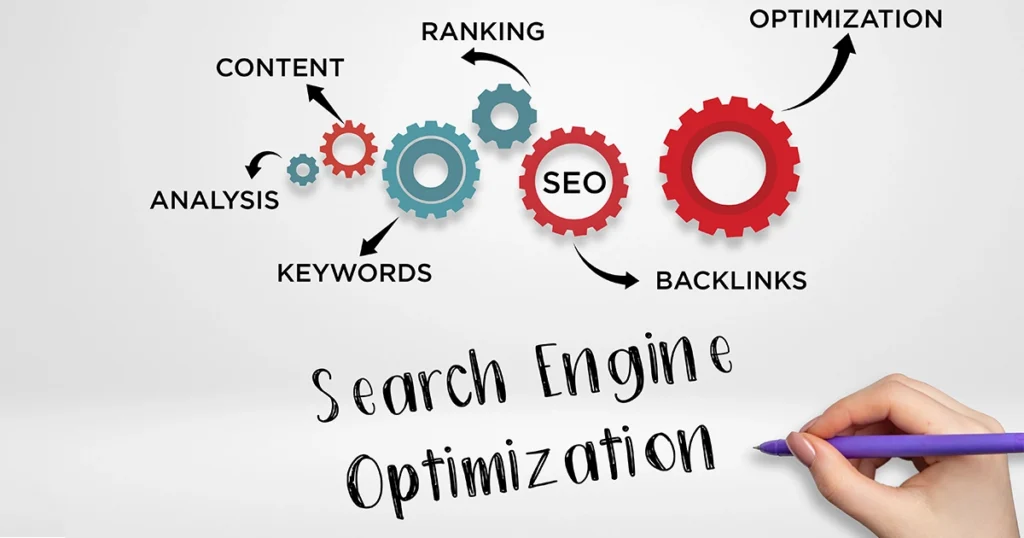SEO is more than optimizing your website’s content and structure. While on-page SEO ensures your website is technically sound and keyword-focused, off-page SEO determines how the rest of the internet perceives you. It’s your digital reputation, the trust, authority, and visibility your brand builds beyond your own domain.
That’s why investing in professional SEO services is essential in 2025. Off-page SEO has become a crucial part of ranking higher, as search engines increasingly prioritize authority, brand mentions, and external trust signals. With the right services—covering backlinks, PR, social media, and local SEO, you can strengthen your credibility, expand reach, and drive more conversions.
What is off-page SEO?
Off-page SEO (sometimes called off-site SEO) includes all actions you take outside your own website to influence rankings. This includes link building, brand mentions, influencer collaborations, social shares, and local citations.
When paired with on-page SEO and technical SEO, these external signals build a digital footprint that proves your site is trustworthy. Search engines don’t just analyze your site, they evaluate how others talk about you. Strong off-page SEO shows you deserve to rank.
Examples of off-page SEO tactics include:
- Securing backlinks from reputable websites
- Being cited in media or industry blogs
- Getting reviews on platforms like Google or Yelp
- Earning shares and mentions on social media
On-Page SEO vs. Off-Page SEO
On-page SEO is about what happens within your website, like keyword optimization, internal linking, meta tags, and fast load times. These tactics help search engines crawl your site and match content to user intent.
Off-page SEO, on the other hand, builds your reputation outside of your website. It’s about trust signals: backlinks, reviews, PR features, influencer collaborations, and community engagement. Without it, even perfectly optimized websites struggle to rank in competitive industries.
Think of it like this:
- On-page SEO = setting up your shop and organizing shelves.
- Off-page SEO = customers recommending your store to others.
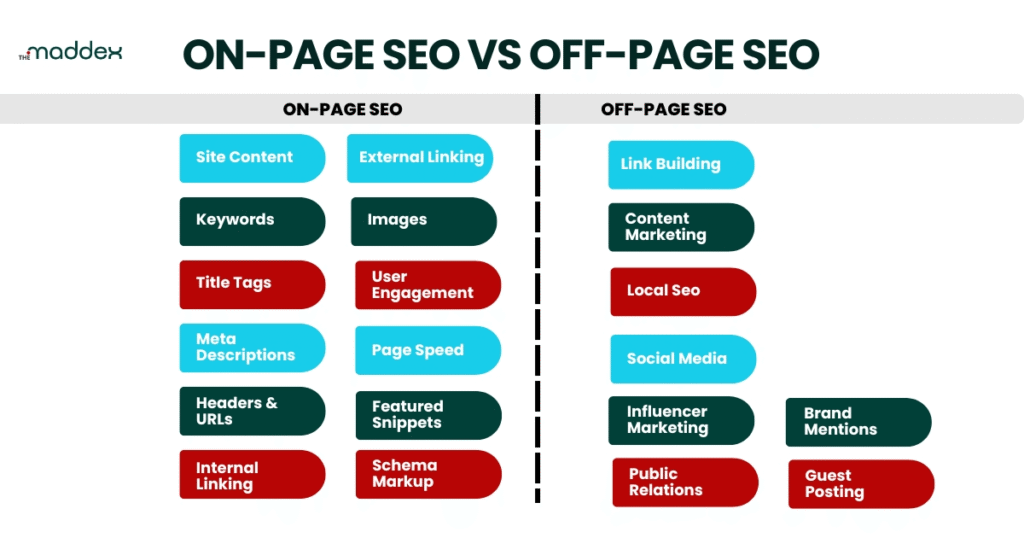
Why does off-page SEO matter?
Off-page SEO matters because it helps search engines and users understand the trustworthiness, popularity, and authority of your website. Without strong off-site signals like backlinks, brand mentions, and reviews, even well-optimized websites may struggle to rank. These external factors act as endorsements, showing Google that your content is valuable and worth displaying to users. In today’s competitive online space, a balanced SEO strategy that includes off-page optimization is essential for sustainable growth and visibility.
Links and mentions influence rankings
When a searcher looks for “where can you get a tattoo at 16 with parental consent,” Google and Bing evaluate which pages best satisfy the query’s intent by examining how many credible sites link to or mention them. Research shows that 91% of web pages receive no organic traffic, largely due to weak backlink profiles. A strategic link-building campaign can change this by securing high-quality citations from authoritative sources.
An example of this can be seen when a legal advice blog links to Mokaram Injury Lawyer’s resources on parental consent laws. This not only boosts Mokaram’s authority in search rankings but also exposes the brand to a relevant audience actively seeking legal guidance.
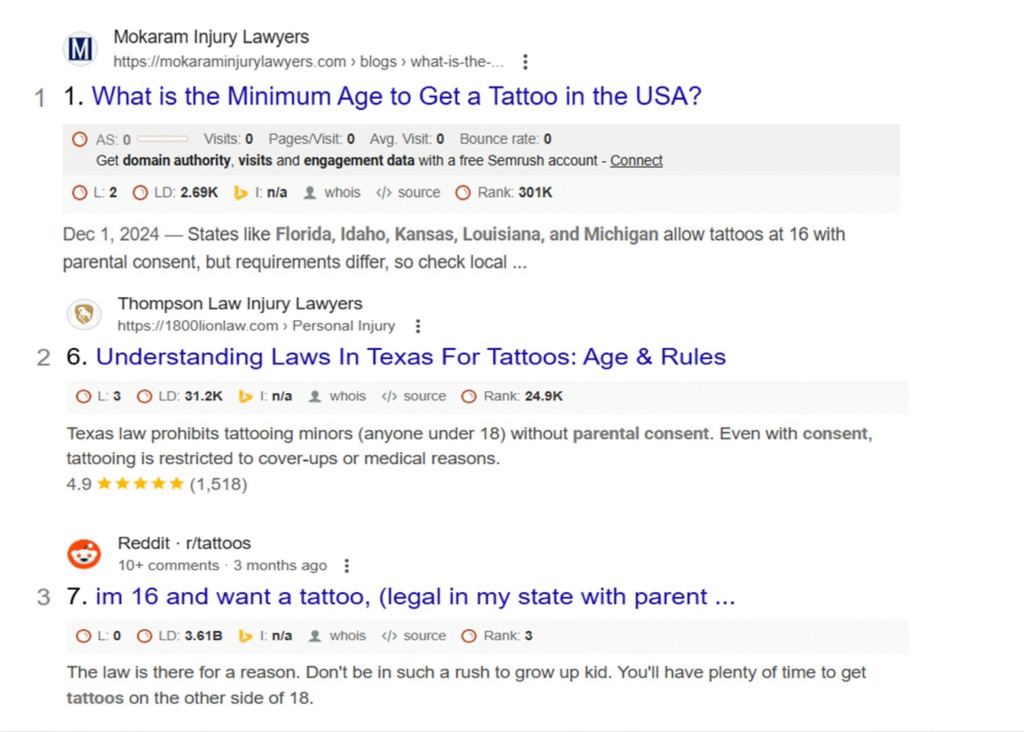
Off-page SEO influences your domain and page authority
Moz’s Domain Authority (DA) and Page Authority (PA) are widely recognized indicators of how likely a website or specific page is to rank in search results. These scores are not used directly by Google but serve as strong predictors of ranking performance because they reflect the strength of your backlink profile, mentions, and overall trust signals.
The Moz data shows that domain-level and page-level link features have the highest influence on Google’s algorithm, scoring above 8.0 in importance compared to other factors. This highlights why off-page strategies such as earning quality backlinks, building citations, and generating reviews are so essential.
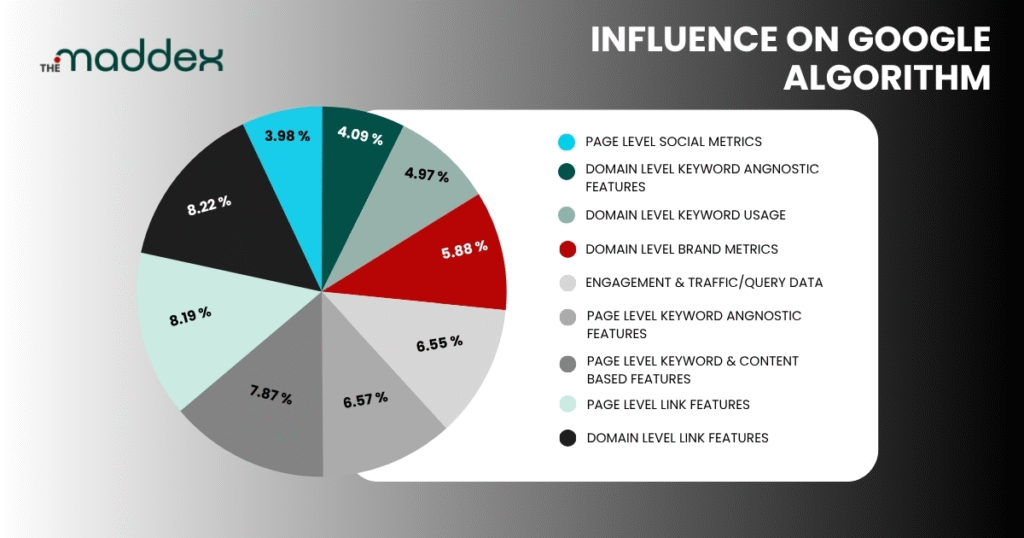
Higher DA and PA mean:
- Greater trust from search engines: Your site is seen as more authoritative, making it easier to compete for tough keywords.
- More visibility for competitive keywords: Strong backlink signals improve your chances of ranking for queries with high search volume.
- Higher referral traffic from external mentions: Links from reputable domains don’t just improve rankings; they also send real, qualified traffic to your site.
Improve E-E-A-T
Google evaluates sites based on Experience, Expertise, Authoritativeness, and Trustworthiness (E-E-A-T). Off-page SEO supports this by getting you featured on reputable sites, cited as an expert, and endorsed by other professionals.
For example:
- Guest blogging = demonstrates expertise
- Webinars/podcasts = show experience and authority
- Positive reviews and PR = reinforce trustworthiness
Track the impact of your branding efforts
Building authority is only half the battle, you also need to track outcomes. Tools like Google Analytics, Moz, or Ahrefs show which off-page activities are driving measurable growth.
Metrics to track include:
- Referral traffic from backlinks
- Brand mentions across blogs and social media
- Backlink quality (anchor text, DA of source)
- Improved keyword rankings after PR or guest posts
By monitoring these signals, you can double down on strategies that deliver results.
Off-page strategies that work
Off-page SEO is all about building authority, credibility, and visibility beyond your website. It’s not just about backlinks, it’s about creating a brand that people talk about, share, and trust. The strategies below are proven to work when executed consistently and with quality in mind.
Content marketing
High-quality content is the foundation of every off-page strategy. Content that educates, solves problems, or entertains has a natural ability to attract backlinks and shares. Beyond blog posts, explore formats like videos, infographics, in-depth guides, case studies, and podcasts. Each type of content serves different audience preferences and expands your visibility.
Why it works:
- Evergreen guides can attract backlinks for years.
- Infographics are shareable and often picked up by blogs and media outlets.
- Podcasts and videos reach audiences who prefer listening or watching over reading.
Guest posting
Guest posting allows you to publish valuable content on other authoritative websites in your niche. It boosts brand recognition, establishes thought leadership, and earns high-quality backlinks that strengthen your site’s authority.
To maximize impact:
✔ Target websites that already rank well in your niche.
✔ Provide content that genuinely educates and informs readers.
✔ Use natural, context-based links back to your website (avoid keyword stuffing).
✔ Build long-term relationships with editors for recurring opportunities.
To find guest posting opportunities, search for sites in your niche using Google search operators. For example, if you’re looking for digital marketing guest post opportunities, you would search for:
- Digital marketing guest post
- Digital marketing write for us
- Guest post opportunities in digital marketing
Webinars and podcasts
Webinars and podcasts allow you to showcase expertise while putting your brand in front of highly engaged audiences. These appearances often lead to backlinks from event pages, transcripts, or media mentions.
To maximize reach:
✔ Collaborate with credible industry experts to boost authority.
✔ Promote sessions through email campaigns, LinkedIn, and other platforms.
✔ Repurpose recordings into bite-sized video clips, blog recaps, or infographics.
✔ Publish takeaways or highlight reels on your own site to attract backlinks.
User-generated content (UGC) on forums like Reddit and Quora
UGC platforms such as Reddit, Quora, and niche-specific forums are excellent for building visibility and trust. By answering questions with in-depth responses, you showcase expertise while subtly driving traffic to your content.
Best practices:
✔ Focus on adding value—not self-promotion.
✔ Link to relevant resources naturally (when it truly helps the reader).
✔ Stay consistent in participating to build a trusted presence over time.
✔ Engage in trending discussions to increase visibility.
Repurposing content
Repurposing is one of the most efficient strategies in off-page SEO. A single blog post can become a LinkedIn carousel, short-form TikTok video, YouTube explainer, infographic, or even a Twitter/X thread. This multiplies your exposure and creates more entry points for backlinks.
Benefits include:
✔ Expanded visibility across multiple platforms.
✔ Higher likelihood of attracting organic backlinks.
✔ Time and resource savings while scaling reach.
✔ Reinforces key messages in different formats for different audiences.
Social media
Social signals don’t directly impact rankings, but they amplify your content’s reach. Viral or shareable posts can be picked up by journalists, bloggers, or niche websites, leading to valuable backlinks. Social platforms also foster relationships that can turn into PR opportunities.
Pro tips:
- Share content in engaging formats (video snippets, stories, polls).
- Respond to comments and engage actively to build trust.
- Run campaigns that encourage sharing, such as challenges or Q&As.
Influencer marketing
Influencers—especially micro-influencers in niche industries—can help amplify your brand’s visibility at lower costs than large-scale campaigns. Their endorsements often come with strong trust signals, audience engagement, and referral traffic.
Why it matters:
✔ Influencers often generate user-generated content that boosts visibility.
✔ Partnerships can lead to long-term collaborations and backlinks.
✔ Influencer reviews and mentions create both brand authority and traffic.
Link Building
Backlinks remain at the heart of Google’s algorithm because they act as digital votes of confidence. However, not all backlinks are equal. The goal is to secure contextual, authoritative, and relevant backlinks that boost both rankings and referral traffic.
Key strategies include:
Digital PR
Digital PR goes beyond traditional press releases. It’s about creating stories, research, or campaigns so unique that media outlets want to cover them.
- Publish industry reports, surveys, or data studies (journalists love citing data).
- Craft newsworthy stories tied to trending events.
- Pitch unique angles to local news outlets for regional exposure.
Example: A SaaS company publishes a “State of Remote Work” report. Major outlets like Forbes or Business Insider reference it, leading to dozens of backlinks.
Brand Mentions
Even when websites mention your brand without a link, it strengthens visibility. But you shouldn’t stop there.
- Use tools like Ahrefs Alerts or Google Alerts to track new mentions.
- Reach out politely to site owners or journalists asking for a clickable link.
- Offer additional resources or images to make it easier for them to update the article.
Why it matters: Converting 20–30% of unlinked mentions into backlinks can provide dozens of high-authority citations with minimal effort.
Broken Link Building
Websites often have outdated or broken external links. Replacing them with your content benefits both parties, you provide value, and you earn a backlink.
How to do it:
- Use tools like Ahrefs’ Broken Link Checker or Screaming Frog to find 404 links.
- Create (or repurpose) content that matches the broken link’s intent.
- Reach out to the webmaster with a polite “fix and replace” suggestion.
HARO and Journalist Requests
Help a Reporter Out (HARO) and alternatives like Qwoted, SourceBottle, or JournoRequest (Twitter/X hashtag) connect journalists with expert sources.
Benefits:
- Secure backlinks from high-DA (Domain Authority) publications.
- Build long-term journalist relationships for repeat features.
- Position yourself as an industry expert.
Pro tip: Respond quickly (within 2 hours), keep pitches concise, and include a short bio + headshot. Journalists value speed and credibility.
Local SEO
Local SEO is critical for service-based businesses, brick-and-mortar stores, and regional companies. It strengthens your visibility in Google Maps, Local Pack results, and localized organic searches.
Local Reviews
Customer reviews aren’t just for reputation, they are ranking signals in Google’s Local Pack algorithm.
- Encourage satisfied customers to leave reviews on Google, Yelp, or industry platforms.
- Respond professionally to both positive and negative reviews (Google values engagement).
- Showcase reviews on your website and social profiles to reinforce trust.

Citations
Citations are online references to your Name, Address, and Phone number (NAP). Inconsistent NAP data across directories confuses search engines.
- Submit listings to trusted directories like Yelp, YellowPages, TripAdvisor, industry-specific platforms, and chamber of commerce websites.
- Use tools like BrightLocal or Whitespark for bulk citation building.
- Audit every 6 months to ensure accuracy.
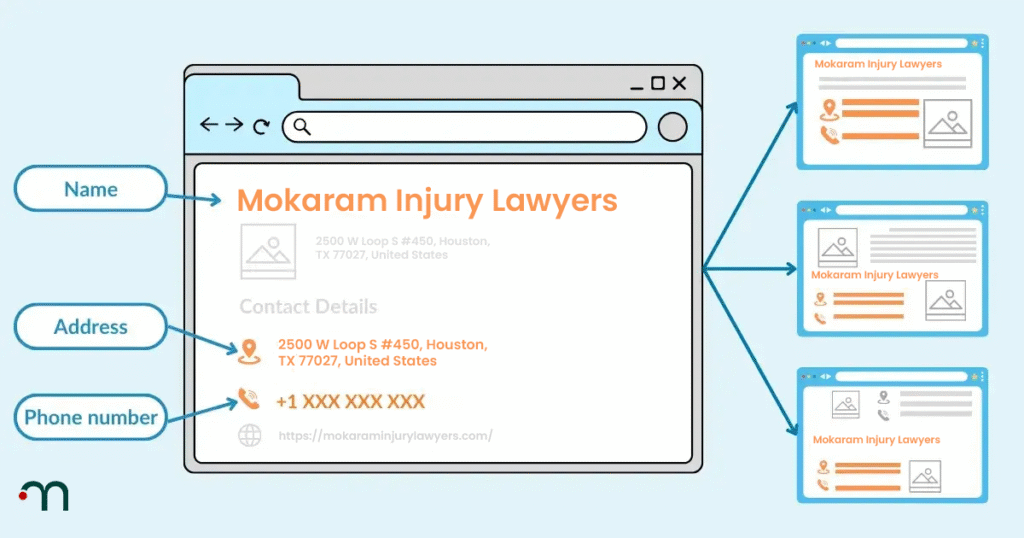
Google Business Profile (GBP)
Your Google Business Profile is often the first impression customers see. A fully optimized profile increases clicks, calls, and map visits.
Optimization checklist:
✔ Add high-quality images and videos (exterior, interior, products, team).
✔ Post weekly updates—offers, blogs, FAQs.
✔ Encourage Q&A engagement (answer customer questions publicly).
✔ Track insights (search queries, phone calls, direction requests).
Pro tip: Businesses that post weekly on GBP receive 2x more engagement than inactive profiles.
Event Marketing
Events provide offline authority that transfers into digital authority. When you speak, sponsor, or host an event, you’re usually mentioned on event websites, press coverage, or recap blogs—all sources of backlinks.
Speaking Engagements
Being a speaker positions you as a thought leader. Event organizers almost always include a speaker bio page with a backlink.
- Target industry-specific events (e.g., SEO conferences, niche summits).
- Record your talks and repurpose them into YouTube videos and blogs.
- Network with attendees to create collaboration and PR opportunities.
Example: A cybersecurity expert speaks at a tech summit. The event website, multiple blogs, and LinkedIn recaps mention them, generating 20+ backlinks from one talk.
Sponsorships and Partnerships
Sponsorships give your brand visibility while generating backlinks from event organizers’ sites. Partnerships with complementary businesses also open backlink exchange opportunities.
- Sponsor webinars, local charity events, or niche meetups.
- Partner with non-competing businesses for co-branded campaigns.
- Always ensure the sponsorship includes a dofollow backlink on their website.
Awards and Industry Recognition
Recognition is not just vanity, it’s a trust signal Google and users pay attention to.
Industry Awards
Winning or even being nominated for awards provides credibility and often a backlink from the awarding body.
- Submit to awards in your niche (e.g., “Best Digital Agency,” “Local Business Awards”).
- Highlight awards on your website and social profiles for trust.
Featured Lists and Rankings
Appearing in “Top 10” or “Best of” lists drives referral traffic and boosts authority.
- Pitch journalists or bloggers to include you in roundups.
- Publish your own curated lists (which can attract reciprocal backlinks).
- Optimize your “About” and “Services” pages for list-based keywords like “best + industry + city.”
Example: A bakery listed in “Top 10 Cupcake Shops in Dallas” sees a spike in both local foot traffic and website visits.
Analyze Your Backlinks and Find New Opportunities
Without tracking progress, your backlink strategy can plateau—or worse, harm rankings if spammy links accumulate.
Key steps:
- Use Google Search Console to monitor all new backlinks.
- Analyze competitors’ backlink profiles with Ahrefs or Semrush → find sites linking to them but not to you.
- Identify and disavow toxic links from spammy or irrelevant sites.
- Set quarterly backlink KPIs (e.g., “Earn 20 backlinks from DR 50+ domains”).
Pro tip: Regularly publishing linkable assets (guides, studies, free tools, calculators) creates backlink opportunities passively over time.
Take Your SEO Further with The Maddex
If you’re serious about scaling your brand’s authority, The Maddex offers advanced off-page SEO solutions. Their team specializes in digital PR, influencer outreach, backlink acquisition, and content amplification strategies designed to withstand algorithm updates.With The Maddex, you don’t just improve rankings, you build a credible, trusted brand that attracts customers, earns media mentions, and maintains visibility long-term.

